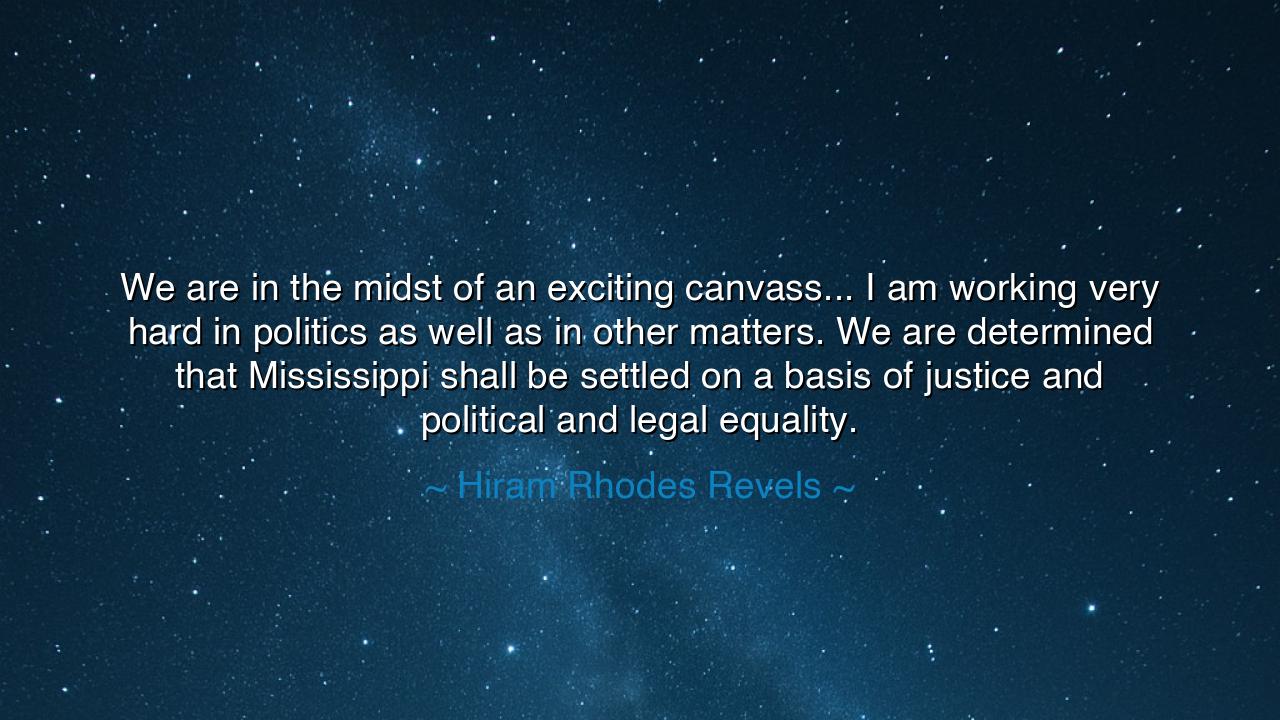
We are in the midst of an exciting canvass... I am working very
We are in the midst of an exciting canvass... I am working very hard in politics as well as in other matters. We are determined that Mississippi shall be settled on a basis of justice and political and legal equality.






When Hiram Rhodes Revels declared, “We are in the midst of an exciting canvass... I am working very hard in politics as well as in other matters. We are determined that Mississippi shall be settled on a basis of justice and political and legal equality,” he was not merely speaking as a man of politics — he was speaking as a prophet of renewal. These words were born from the soil of a wounded nation, a land emerging from the shadow of civil war, where the chains of slavery had been shattered but the spirit of freedom was still learning to breathe. In this declaration, Revels embodied the courage of one who understood that true justice is not given freely; it must be built, stone by stone, through labor, faith, and unyielding will.
Revels stood as a living contradiction to the prejudices of his age — the first African American senator in the history of the United States, representing the very state that had once enslaved his people. His rise was itself a revolution of conscience. When he spoke of “political and legal equality,” he spoke not only for Mississippi but for all souls born into struggle. To him, equality was not an abstract concept written in distant documents; it was the foundation upon which a righteous society must stand. And so, he labored not for power, but for restoration — for a moral order that recognized the divine image in every man and woman.
Think of the courage it took to utter such words in that time — when bitterness still stained the air, when the old powers sought to rebuild their thrones upon the ashes of war. The canvass he spoke of was more than a political campaign; it was a sacred struggle between the past and the future, between oppression and justice. Revels was not painting with ink and parchment alone — he was painting with hope, with faith, and with the blood of generations who had long been silenced. His every speech, every act of leadership, was a brushstroke upon the soul of a reborn America.
To understand his vision, recall the stories of those who walked beside him. Freedmen who once tilled the soil in bondage now gathered in churches and town halls, learning to read, to vote, to lead. Teachers and ministers — black and white — risked their lives to build schools for children who had never known the alphabet of liberty. These were the living pillars of justice and equality that Revels dreamed of — not decreed from above, but raised by hands that had once been bound. In their work, the promise of America began to take flesh.
Yet, the dream was not without its torment. The forces of hate rose again like old ghosts, cloaked in law and violence. Reconstruction’s dawn was soon shadowed by nightfall — by disenfranchisement, segregation, and terror. But even as darkness closed in, Revels’ words endured, reminding future generations that equality must never rest on the approval of the powerful. It must be demanded by the people, renewed in each age, defended in every heart that refuses to bow to injustice.
In his voice, we hear an eternal truth: justice is not the gift of the victorious; it is the right of the living. Equality is not merely written in constitutions; it must be practiced in the soul. To settle a nation “on a basis of justice” is to ensure that no man’s dignity is measured by color, creed, or circumstance — that the law serves the spirit of compassion, not the greed of the few. Revels, like the prophets of old, understood that a nation is not made great by its wealth or armies, but by the fairness with which it treats its weakest.
Let this teaching be carried onward: when you see injustice, do not be silent. When equality is mocked, defend it with your words and your deeds. Be steadfast as Revels was — patient in hardship, fearless in truth. For every age will have its struggle, every generation its canvass. And if we are faithful to the labor of justice, we too shall settle our world upon a foundation that time cannot shake — a foundation built of justice, political and legal equality, and the eternal dignity of humankind.






AAdministratorAdministrator
Welcome, honored guests. Please leave a comment, we will respond soon